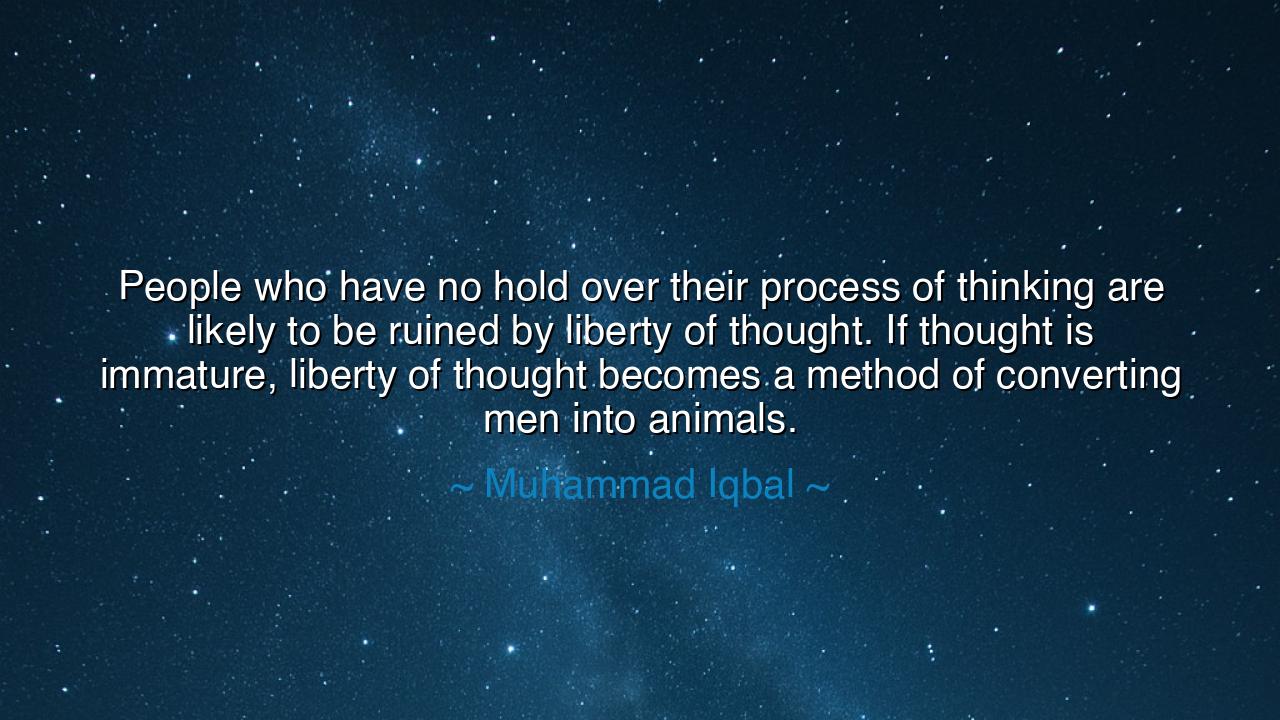
People who have no hold over their process of thinking are likely
People who have no hold over their process of thinking are likely to be ruined by liberty of thought. If thought is immature, liberty of thought becomes a method of converting men into animals.






"People who have no hold over their process of thinking are likely to be ruined by liberty of thought. If thought is immature, liberty of thought becomes a method of converting men into animals." These words, spoken by the great philosopher Muhammad Iqbal, carry with them a profound warning about the nature of freedom and responsibility. In an age where liberty is often exalted as the highest virtue, Iqbal reminds us that freedom—specifically the freedom of thought—is not a gift to be taken lightly. It is a force that, if not tempered by wisdom and discipline, can lead to the destruction of the very humanity it is meant to protect.
Freedom of thought is not merely the ability to think freely; it is the capacity to shape those thoughts with integrity and purpose. Without control over the mind, without the ability to guide our thoughts toward maturity and clarity, liberty can easily devolve into chaos. The mind without direction, like a ship without a rudder, can wander aimlessly, driven only by impulse and whimsy. And in this lack of discipline, thought can easily be distorted, leading to actions that, while outwardly free, are inwardly destructive. Iqbal's message is clear: true freedom requires responsibility, for without it, we risk becoming slaves to our own impulses, losing the very essence of what it means to be human.
To understand Iqbal’s words, we must look to the ancient wisdom that teaches us that true freedom is found not in the unchecked exercise of desire, but in the mastery of the self. The ancient Greek philosopher Socrates, for example, believed that wisdom came not from the accumulation of knowledge, but from the self-examination of one’s thoughts. Socrates famously said, “The unexamined life is not worth living.” His wisdom teaches us that without the discipline to reflect upon our thoughts, to question them and guide them, we are at risk of becoming prisoners to ignorance and impulse, no matter how free we believe ourselves to be. In this sense, Iqbal echoes the ancient call for the cultivation of self-control and reflection in the face of liberty.
History offers us countless examples of individuals and societies who, in the absence of disciplined thought, fell prey to the destructive forces of unchecked liberty. Take, for instance, the chaotic period following the French Revolution. The initial cry for freedom and equality led to the Reign of Terror, where liberty was wielded as a sword of destruction. Leaders, driven by impulsive emotions and a lack of thoughtful reflection, turned the very ideals of freedom into a weapon against their own people. The revolutionaries, in their zeal for liberty, failed to reflect on the consequences of their unchecked actions. In this way, their freedom was corrupted, and it became a force that tore apart the fabric of their society rather than lifting it up.
This destructive potential of immature thought is also evident in the rise of tyranny throughout history. Tyrants have often used the allure of freedom to manipulate the masses, promising liberation while sowing the seeds of chaos. Consider the words of Adolf Hitler in the lead-up to World War II. He promised the people of Germany a freedom from their perceived humiliation, a liberation from the shackles of economic hardship and national shame. Yet, in the absence of sound moral guidance, in a nation whose collective thought had become increasingly immature and uncritical, the freedom he promised led to the destruction of not only his own people but to the entire world. The liberty of thought, when guided by the immature mind, does not lead to true freedom but to devastation.
So, what lesson does Iqbal offer us? It is this: true freedom is not the ability to think without constraint, but the ability to think with maturity and discipline. The freedom to express one’s thoughts must be accompanied by the responsibility to reflect, to examine, and to judge those thoughts with wisdom. If we fail to do this, the liberty of thought becomes not a tool for growth, but a force that can turn us toward destruction, just as unchecked impulses can turn men into beasts.
In your own life, take responsibility for your thoughts. Do not let them run wild with impulsivity, for they shape your actions and, ultimately, your fate. Reflect before you act, and remember that true freedom comes not from acting without restraint, but from mastering the mind. Cultivate discipline and self-awareness, for these are the tools that will allow you to navigate the vast ocean of thought without being swallowed by the waves of chaos. In the end, it is not the freedom to do anything we desire, but the freedom to choose wisely, to act with integrity, and to think with maturity that defines our true humanity.






AAdministratorAdministrator
Welcome, honored guests. Please leave a comment, we will respond soon